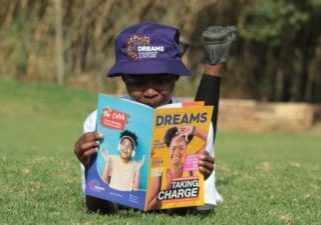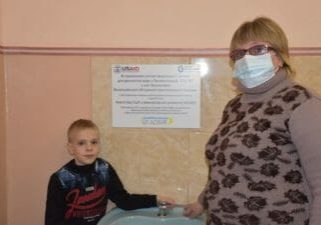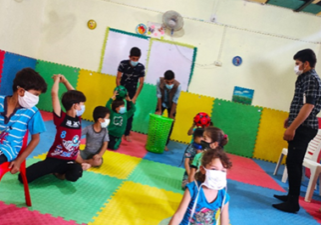News > Blog
Slobozhanska CC Strategy: European Practice for Local Waste Sorting
Published 02/18/2021 by globalcommunities

Efficient, affordable handling of waste management is a critical concern in Ukraine. Residents of Slobozhanska consolidated community decided not to wait for government guidance and proceeded with implementing the Law of Ukraine On Waste Management at the local level. This was in line with the CC Development Strategy which highlights the importance of protecting ecology and sorting solid household waste.
The Slobozhanska community also detailed a relevant Service Delivery Improvement Plan for five years. In 2018, the USAID “Decentralization Offering Better Results and Efficiency” (DOBRE) Program supported the CC and delivered a new garbage truck (link 1 in UA, link 2 in UA).
All links lead to the documents, social media pages or videos in Ukrainian (2018-2019).
Raising the Quality of Service Provision
Representatives of local governance and active residents implemented the following activities:
allocated budget funds;
a shed for the local communal entity to store equipment and the garbage truck;
procured household supplies and containers;
50 containers for collecting plastic, paper and tin waste;
300 individual containers (240L) to the private sector;
rolled out information and awareness campaign; and
300 contracts to provide waste handling services.
They also resolved other issues about the waste management service provision in “Slobozhanske Sorts” Facebook group.
Information and Awareness Campaign in Schools
In 2019, USAID DOBRE Program provided technical assistance in schools and procured 64 training containers. The containers were installed in Slobozhanske training and educational complex #1, secondary school #2; Stepnyanske secondary school; in pre-school educational establishments “Dyvosvit”, “Chervona Shapochka” and “Berizka” in Slobozhanske and at the “Sonechko” similar entity in Stepove village. Members of the local ecology-oriented group showed children how to sort waste properly during the specially organized trainings (link 1 in UA, link 2 in UA, link 3 in UA).
As part of the Zero Waste School project initiative, members of the ecology oriented community of Slobozhanske training and education complex #1 carried out awareness activities on waste sorting practices for local residents. They created thematic leaflets and another Facebook group with information and tips on reducing and handling waste. – Collecting Waste European Style in Slobozhanske.
Ivan Kaminsky, Head of Slobozhanska CC, explains: “In our community, starting from pre-school, we train children to sort waste. In every kindergarten, we give good attention to raising kids [who are] ecologically minded. Under current conditions, it is very important to change residents’ understanding, to take care of their health and to improve the ecological state of the CC. The easiest way to introduce changes is through responsible behavior of children.”
The community activists also held the “ECO Day” (link in UA), where students learned how to sort waste during master workshops. Local youth talked to adults about the rules of handling solid waste management.
“Our school students realize that nowadays it is necessary to save the resources of the planet, to prevent from the ecological emergency and to save the world. One step towards this is simply to sort out waste,” says Valentyna Polovets, Teacher and Ecological Project Manager.
Priority “We would like to Live in the Clean Country!”
Slobozhanska Settlement Council implemented Participatory Budget. The kind of civic engagement mechanism that encourages residents to take part in the local budget funds allocation through creating projects for the territorial community development. They can select the best project based on the highest score of total votes. Essentially, the mechanism application allows learning about the most critical issues that community members express their concern about. It also defines how efficient the work of local governance is when implementing community based project initiatives. The “Sort waste to improve the living” project by Valentyna Polovets was selected as the winner. The project team created posters illustrating guidelines for sorting waste. Young activists trained their peers, elementary school kids and residents of other age groups about waste management in a comprehensive manner and with good visual materials.
Svitlana Golendyayeva, Head of the School, pointed out: “This is not the first initiative that our children carry out. With USAID DOBRE support, in our school we have a school radio that we actively utilize for ecology upbringing. We always teach children to be open to new knowledge and innovations, follow the lead of the current and even be ahead of it. Most important is that our teachers are also willing to deliver the message to the children that they are the owners of the Earth. The future of their community, country and planet is in their hands.”
Best Practices Dissemination
The students’ successful experience was acknowledged at the Competitions of the Oblast and All-Ukrainian levels. Among them was then-11th grade student Mykyta Siridyuk, who authored the “Sort the Waste to Improve the Living” research under the Small Academy of Science. He became the winner of the third Oblast level Ecology Competition. He was granted the first prize at another Oblast level contest among young naturalists 2019, in the “Practical Nature Preserving Activities and Ecology” category, under the “Live, Earth” nomination.
Viewers of the news programs at TV Channel 34 (in UA) та TV Channel Inter (in UA) learned about the youth who encouraged to join the initiative “For Clean Environment” and about waste sorting in Slobozhanske training and education complex #1.
At school, the students not only learned how to sort out waste properly, but they also beautified the schoolyard into the the territory of beauty and flowers with the funds raised from recycling in the community.
“Children realized that there was no need to follow the European model. They decided to prove that we are dignified to be the center of Europe and to demonstrate to other countries how to live in harmony with nature,” says teacher Valentyna Polovets. “This is how the initiative appeared to utilize the raised funds from recycling for purchasing plant seedlings and flowers for the schoolyard and local dendropark. Crocuses, hyacinths, tulips and daffodils bloomed richly in the spring. Later the schoolyard was adorned with lilies, roses and green grass. All natural beauty grew into a multi-colored impressive living picture.”
To crown it all, the community learned what European model for waste management encompassed: waste separate collection activities, zero waste initiatives, recycling, and even fundraising. Through training and awareness campaigns among various age groups of residents, the CC successfully applied the model. Slobozhanska is happy to acknowledge that the best practices of waste sorting, widely used in the European Union countries, can be easily implemented at the community level too.
© This publication is made possible by the generous support of the American people through the United States Agency for International Development (USAID). The contents are the responsibility of Global Communities and do not necessarily reflect the views of USAID or the United States Government.






